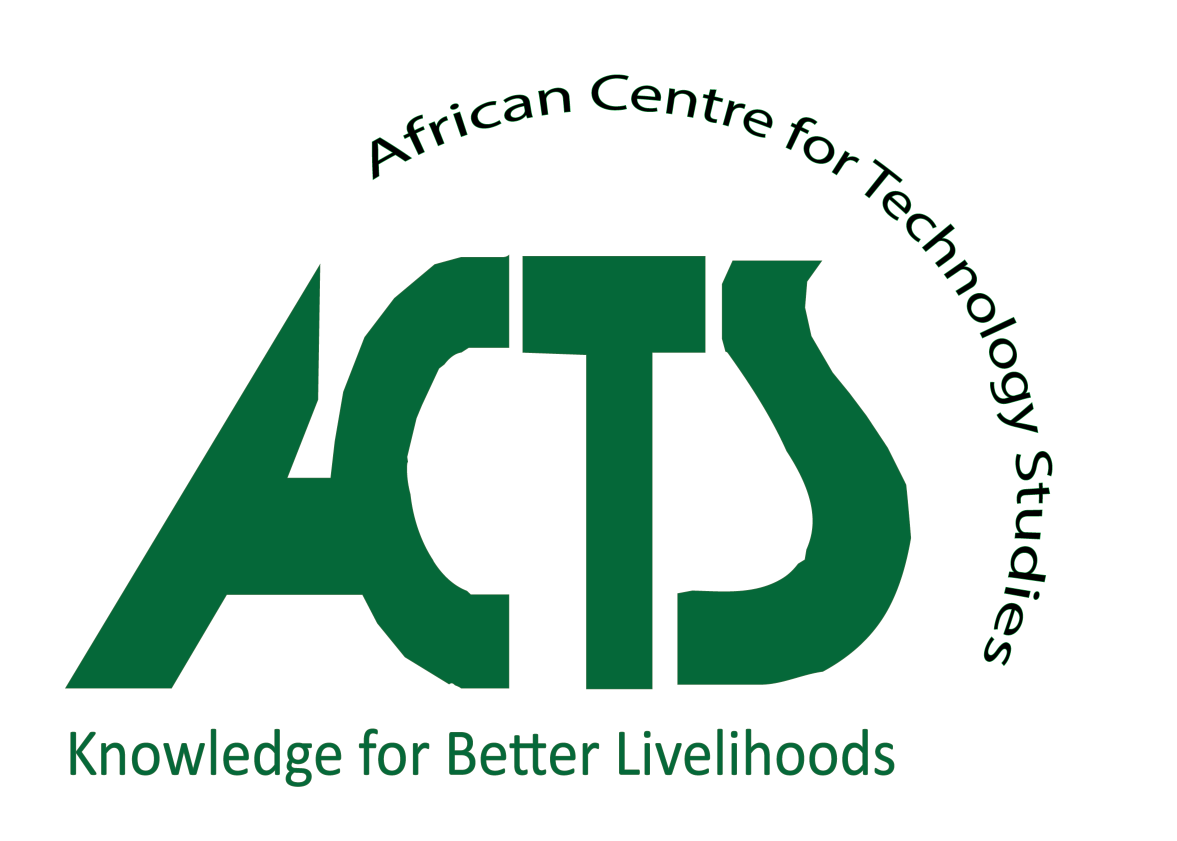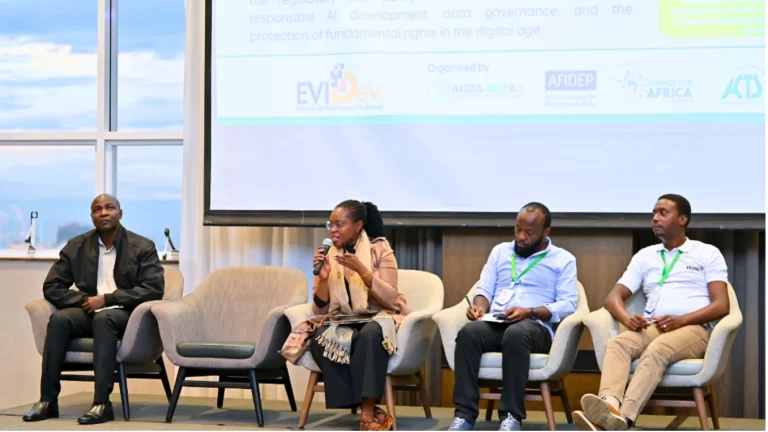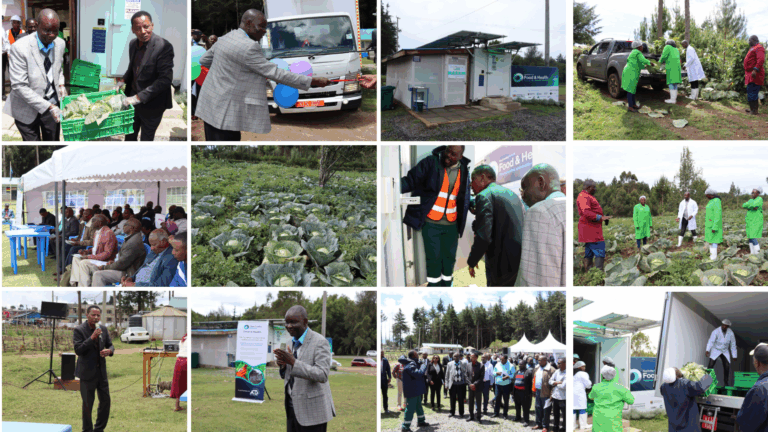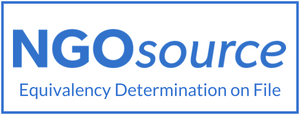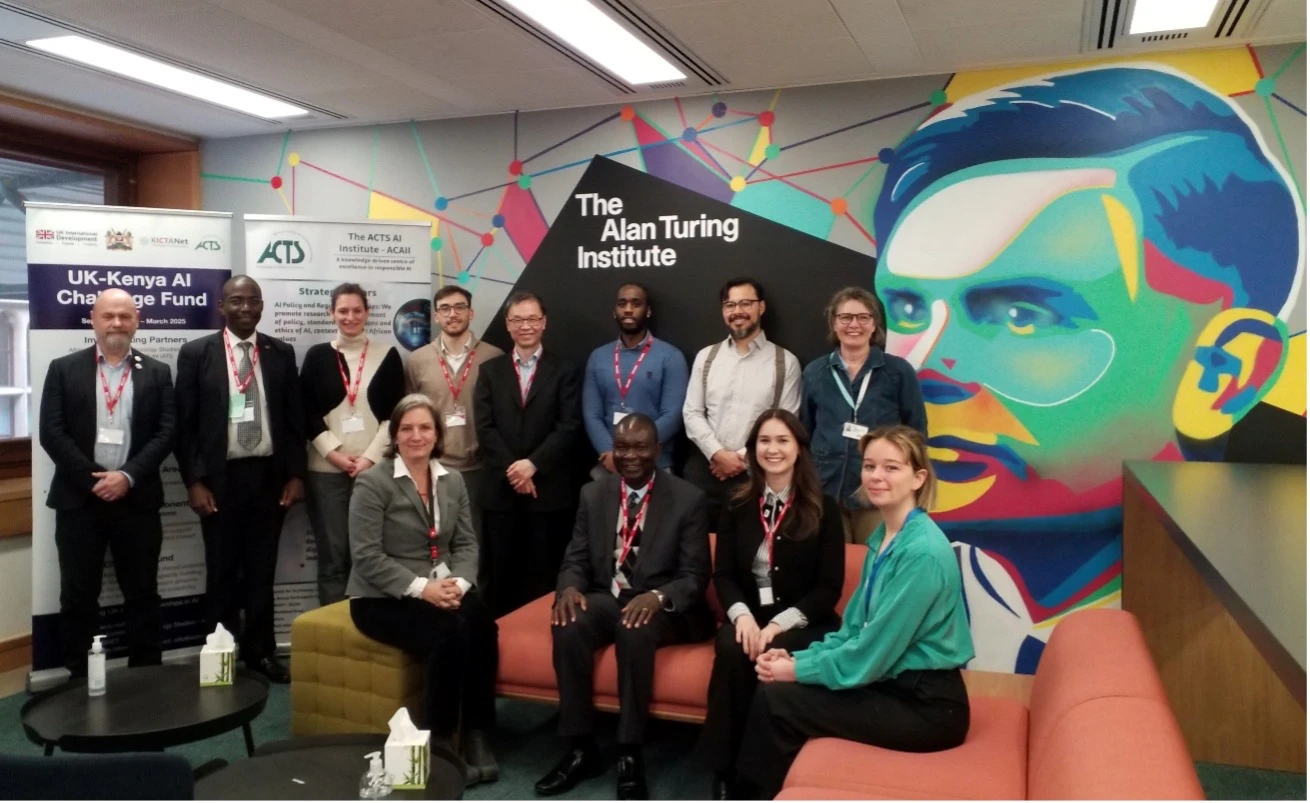
Participants’ group photo at the UK-Kenya AI Challenge Mini-workshop held on 19th of March 2025, at the Alan Turing Institute Office, London, United Kingdom.
Kenya and the United Kingdom are forging a dynamic and revolutionary partnership to advance artificial intelligence (AI) innovation. This collaboration, known as the UK-Kenya AI Challenge, is a strategic initiative that aims to build AI capabilities that are safe, ethical, and accessible to all. It seeks to create an inclusive digital future, particularly in low- and middle-income countries like Kenya.
The UK-Kenya AI Challenge was born from a two-day AI tech ecosystem visit by a Kenyan delegation to the UK. The delegation committed to a collective vision to build robust AI ecosystems that align with national policies and foster long-term cooperation.
On the 19th of March 2025, key stakeholders gathered at the Alan Turing Institute offices in London, United Kingdom, to reflect on the progress made, consolidate learnings, and plan for sustainable collaboration beyond the current funding cycle. The hybrid mini-workshop featured project teams from both countries, who shared their successes and discussed future opportunities for scaling up their innovations.
Overcoming challenges through continuous knowledge exchange
The partnership between the UK and Kenya has grown stronger since its inception, driving AI projects that span healthcare, data management, and public service optimisation. Even so, stakeholders acknowledged there were initial difficulties in bringing diverse teams from Kenya and the UK together to work on complex AI projects.
However, through open communication, continuous dialogue, and knowledge sharing, the teams have formed strong bonds and established synergies that have propelled the projects forward, despite the relatively short implementation period. This collaborative spirit extends beyond academia to include public and private sector stakeholders, creating a holistic and multi-faceted approach to AI innovation.
Challenges remain, particularly in aligning AI-driven diagnostic tools with government protocols and achieving official recognition. To navigate these issues, participants proposed the need to develop open-source models while adhering strictly to established standards. This approach not only enhances the reliability of the solutions but also ensures their readiness for integration into public systems.
Participants agreed that developing solutions that are both sustainable and scalable is vital. This requires piloting innovative tools, monitoring their effectiveness, and planning for their long-term deployment. Therefore, continuous knowledge sharing between Kenyan and UK researchers is an essential aspect of the UK-Kenya AI Challenge.
Prof. Tom Migun Ogada, ACTS Executive Director, emphasised the importance of sustaining the partnerships established through this initiative beyond the project, stating,
“Although the implementation time has been short, it is crucial not only to derive benefits from this engagement but, more importantly, to ensure the continuity of these partnerships for the future.”
Partnership toward inclusivity and diversity in AI innovation
A critical aspect of the UK-Kenya AI Challenge is promoting inclusivity and diversity, particularly for women and marginalised groups. Thus, there is a need to create supportive environments where both female and male academics can share their career struggles and successes, which is vital to fostering inclusivity.
Notably, ACTS, through the ACTS AI Institute, has made deliberate efforts to include women in the development and implementation of AI for development through scholarship programmes targeted at women undertaking their post-doctoral studies, master’s, and early careers in AI. Through that, ACTS has established a network of about 80 AI scholars and researchers in 22 universities, across 18 countries where 40% of the scholars are women.
What does the future hold?
Looking ahead, the UK-Kenya AI Challenge sees a future where AI-powered solutions are widely adopted across sectors to enhance efficiency in addressing development issues. The initiative serves as a model of how international partnerships can leverage technology to drive meaningful change. Therefore, as the collaboration moves forward, the focus will be on scaling successful projects while ensuring that solutions are both sustainable and impactful.
To ensure the long-term success of AI innovations, participants emphasised aligning AI innovations with national policies and health protocols. Gaining government approval and public trust is crucial for sustainably integrating AI solutions into public services, especially in sectors like healthcare.
Speaking at the event, representatives from the British High Commission emphasised the importance of fostering responsible and scalable AI solutions.
“We would like to strengthen the whole ecosystem of AI through the partnerships that we are developing. In the next coming weeks, we will focus on looking at each and every solution to ensure that these use cases are sustainable and scalable. I believe that if we focus on those two key points, then what we’ll be ensuring is that we are creating impact out of this initiative,” noted Wilfred Oluoch, speaking on behalf of the British High Commission.
Similarly, Samuel Wanjau, ACTS Research Fellow, encouraged a continued focus on sustainable, scalable, and impactful solutions. He acknowledged that while much progress had been made, there remained opportunities to do even more to ensure the long-term success of AI applications.
“We don’t get to the end by simply innovating. We need to ensure that what we develop can be maintained and expanded to benefit more people,” Samuel noted.
Eliza Riley Smith, AI International Policy Advisor at the AI Policy Directorate Department for Science, Innovation and Technology underscored the significance of aligning the collaboration’s goals with the UK government’s AI priorities. She expressed her excitement at seeing the ambition and innovation demonstrated by the project teams. She highlighted that the partnership reflects the spirit of international cooperation and shared progress.
Further, participants recognise that the journey from innovation to implementation requires continuous effort, community engagement, and government support. Therefore, future priorities will include building capacity among stakeholders, and ensuring that AI solutions are accessible to all, including marginalised groups and people with disabilities. Lastly, participants agreed on continuous dialogue, collaboration, and knowledge transfer to shape a more innovative and resilient future.
The UK – Kenya AI Challenge Fund is a programme that is implemented by ACTS, in collaboration with the Alan Turing Institute, KICTANet and with funding from the British High Commission and the Foreign, Commonwealth and Development Office (FCDO).
Written by Pauline Soy, ACTS Communications and Outreach Officer
Related resources:
